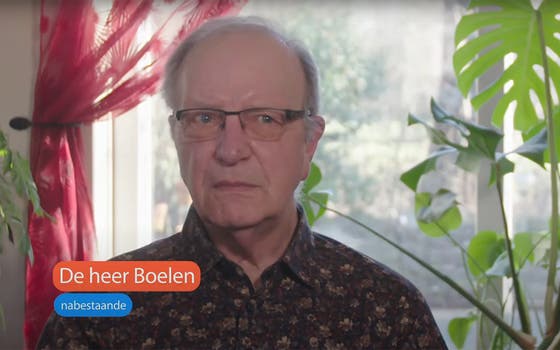Adrienne Cullen Lecture: communication in the event of errors

Adequate care for the patient's family and an investigation report that is also understandable to relatives. These important points for improvement in communication in the event of medical errors were the theme of the fourth Adrienne Cullen Lecture presented on Friday, March 25 at the UMC Utrecht.
The lecture started with a video from 2018 in which Ms. Adrienne Cullen, who died that year from cervical cancer as a result of a medical error at the UMC Utrecht, explains what went wrong with her, how we as a hospital subsequently dealt with this and how it affected her and her loved ones. Named in Adrienne Cullen's honor, this lecture has since been held annually at the UMC Utrecht and is intended to learn from medical mistakes.
Learning to communicate about errors
After what is still a poignant video, moderator Hans van Delden, professor of medical ethics, talked to Remco van Lunteren, member of the Executive Board of the UMC Utrecht, about why a lecture like this is necessary. “Openness is extremely important where medical errors are concerned. We have to keep that dialog going. Not only in a lecture like this, but in our day-to-day healthcare practice as well. This applies to our healthcare providers, but just as much to us as hospital administrators. We mustn't forget that care is about people. Making mistakes is only human, but we must continue to learn and communicate openly about mistakes so as to prevent even more suffering," said Remco van Lunteren.
Being open and honest helps people come to terms
In the lecture 'Learning from incidents; pure culture!' Hans Brölmann, co-founder of the foundation Openheid Na Incidenten [openness after incidents], discussed the importance of effective communication after a medical incident. Hans said that everyone endorses the importance of open disclosure in healthcare. It appears, however, that such openness is not always given, despite the good intentions of healthcare professionals. In his manual on open disclosure after incidents in healthcare, he describes why this is and what can be done to improve communication following an incident. For example, an open and honest conversation with patients and their relatives helps them as well as the care provider come to terms with the traumatic experience more quickly and more effectively.
Attention to family and understandable report
In 2018, Adrienne Cullen shared her story about a medical error. This time, Mr. Jeu Boelen addressed the audience in a personal video message as next of kin. His wife Mirjam, who suffered from a muscle disease, died at the UMC Utrecht due to a medical error. This happened while he was sitting unawares in the waiting room. In the video, Jeu Boelen describes this dramatic moment, when he suddenly got the feeling that something serious was going on. What he missed most in that moment was someone to help and support him and tell him what was going on with his wife. This incident had a long and intensive follow-up process, because the investigation report contained a number of errors and inaccuracies. Based on his experiences, Mr. Boelen advises to provide proper guidance to the patient's family or caretakers. This can take away a lot of pain afterward. He also argues for better reporting and reports that are also understandable to relatives.
Own up to the mistake and show empathy
The concluding panel discussion addressed the video and Mr. Boelen's clear message. What can we as UMC Utrecht do better? In the event of a suspected incident, the incident management committee takes action and organizes a meeting with the patient within 24 hours. However, there is a lot of time between an incident and the final investigation report, which often only becomes available to patients and relatives after three months. That time is needed to be as thorough as possible, says Mariëlle Emmelot, chair of the incident management committee.
Jeu Boelen's experience underlines the importance of a thorough and comprehensible investigation report. The incident management committee will take action on this.
The patient support system at UMC Utrecht has since been supplemented with guidance for the care provider in this process, or peer support. Hans Brölmann emphasized the importance of healthcare professionals showing empathy in their communication with patients and their families. Own up to the mistake and show empathy. He also recommended organizing more touchpoints between healthcare professional and patient during the long period between the incident and the investigation report. Mr. Boelen said he did not really miss that contact, also because he needed time to cope with the loss of his wife. Mr. Boelen concluded by saying that "the idea that people know my wife takes away a lot of the pain," confirming the importance of personal contact between healthcare professionals and patient.
View the fourth Adrienne Cullen Lecture here.
About the Adrienne Cullen Lecture
The 'Adrienne Cullen Lecture on Open Disclosure After Serious Harm' is held annually at the UMC Utrecht. The first lecture was held in 2018 when Ms. Adrienne Cullen and two of her doctors spoke openly about the medical error that led to her end-stage cervical cancer. Ms. Cullen passed away on December 31, 2018. This lecture is named after her so that as a hospital we can learn from things that go wrong and, through openness, prevent similar mistakes from being made again. Read more on our website.
